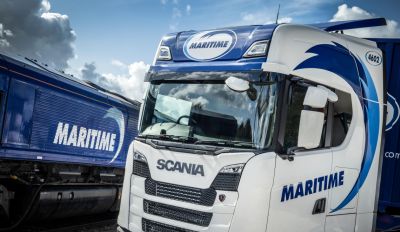Feature, Freight News, Rail, Road, Sea
Maritime orders first electric trucks
[ April 22, 2024 // Chris Lewis ]Maritime Transport has ordered 18 battery-electric, 42-tonne tractor units, the first of a consignment of 48 battery-electric and hydrogen fuel cell trucks that the intermodal operator plans to deploy across its network.
Maritime, which is a participant in the Zero Emission HGV and Infrastructure Demonstrator (ZEHID) will intregrate the electric trucks, supplied by Scania, Renault Trucks, and DAF, into Maritime’s fleet as part of the eFREIGHT 2030 consortium, led by Voltempo. The consortium is one of four selected to join ZEHID and is being part-funded by the Department for Transport in partnership with Innovate UK to support the freight sector on its path to Net Zero.
By 2026, there will be 11 fleets within the Voltempo consortium deploying electric HGVs and a nationwide HGV charging network using British-built chargers. Each charge hub will provide at least six charge bays and 1MW of power.
The new three axle (4×2) trucks are capable of a range of 300-500km, allowing them to serve Maritime’s eight rail freight terminals and to and from major UK ports. The introduction of these trucks is a core component of Maritime’s environmental agenda to accelerate modal shift, effectively moving more containerised and domestic product by rail with battery-electric and hydrogen fuel cell trucks on first and final mile deliveries.
The trucks are planned to arrive from late 2024 and into early 2025. Electric charging stations will also be installed across the Company’s network of 41 transport depots, rail terminals, and dedicated container storage sites.
Deputy chief executive, Tom Williams, said: “This investment places us at the forefront of our industry’s transition to sustainable operations and we are excited to initiate this phase of our environmental strategy. Our active participation in ZEHID and pioneering initiatives like eFREIGHT 2030 over the next five years is set to yield vital insights for the government’s long-term infrastructure decisions to make road freight more sustainable and reduce greenhouse gas emissions. Acknowledging the variations in range and payload, we believe these vehicles will substantially contribute to our efforts in providing sustainable and efficient services to our customers, complementing our growing network of rail freight services and terminals.”
Scania UK managing director, Chris Newitt, added: “Through these first vehicles, we will be able to learn so much about operating and using these vehicles day-to-day. The next step will be how can we use that knowledge to influence long-term decision making for the best interests of our industries.”

Tags: Maritime











